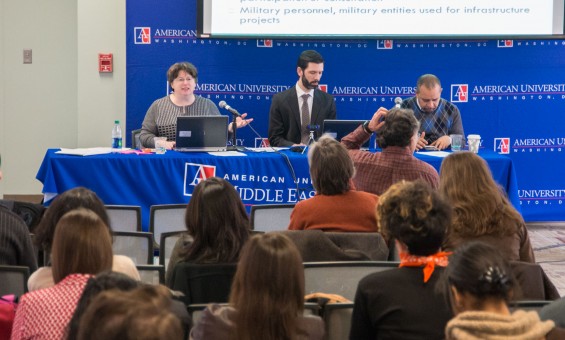
Symposium | Grounding Political Change in Egypt
After introductory remarks by Professor Singerman, Mr. Stanek presented a brief history of the state-driven, top-down urban planning paradigm in Egypt and using Henri Lefebvre’s notion of the Right to the City, suggested that planners and decision makers in Egypt should embrace to the vision which community members have for their own neighborhoods in order to accommodate the popular demands of the revolution.
Mr. Ibrahim presented several case studies which explored how citizens and non-government organizations have challenged Mubarak-era planning paradigms and more recently, produced revolutionary strategies to address the deficit in public services provision. He highlighted efforts by neighborhood Popular Committees to improve their communities, the innovative Darb Al-Ahmar urban upgrading project, and some do-it-yourself service provision projects. Mr. Ibrahim argued that despite the transformative potential of the revolution, the government’s approach to urban space in Egypt has not changed very much, and instead of devolving decision making to a more local level, the army is currently implementing urban upgrading projects without public deliberation or participation from the residents and community activists who live there.
Professor Singerman concluded by calling for the reform of local administration in Egypt in light of the democratic objectives of the revolution. She critiqued the current status of the local administration system, but also pointed to promising developments in the 2014 Constitution. She suggested a more open, democratic form of local politics can enrich and complement national politics, disrupt patronage networks, and improve responsiveness to communities. In particular, TADAMUN has promoted the ideal of the “Right to the City” as a rights-based, democratic, participatory and equitable strategy to confront urban challenges. She described how a national political party during the Brazilian post-military political transition devolved power to the local level through various strategies, such as participatory budgeting, and improved local service provision, while at the same time strengthening their own electoral power. “Going Local” in Egypt may be a useful strategy for weak political parties to gain a more national profile, while improving local services and civic participation. She concluded by discussing four aspects of democratization that national political leaders as well as activists should focus on: the right to access information; full representation and participation at the local government; social accountability; and local government capacity building.
Adel Iskandar closed with a commentary on the session. Mr Iskendar first challenged the audience and panelists to think about how the fictionalized version of Cairo embodied in the high modernist plans of the state as well as the idyllic advertising of the desert cities have impacted the way Cairenes perceive themselves, their futures, and society at large. He stressed the notion that the dichotomy between formal and informal is false and that the State as the sole representative of the formal is also questionable and that the production of space is a constant negotiation of both formality and informality within the government, within society, and between the two. Finally, Mr. Iskandar suggested that there is a fundamental shift taking place between the government and society in which citizens are recognizing the power of local action. He believes the government will not able to control this shift and will eventually have to concede power to the local, reshaping decades of government policies that have diminished the value and knowledge of local communities.
Mr. Iskandar’s commentary was followed by a question and answer session.









Comments